專欄
漸漸消失的老戲院,不再轉動的膠捲聲 Vanishing Old Theater, the Sound of Stopped Spinning Film
在臺東說到看電影大概只想到臺東市區轉運站旁的秀泰影城,但大家可以想像嗎?在民國六、七十年代臺東區從北到南曾有30多間電影院,幾乎每個鄉鎮都有二家戲院,就連遠在蘭嶼的勵德管訓班也有電影播出;戲院不僅僅是播放電影,也不定期有布袋戲、歌仔戲,或是歌舞團表演,可以說是臺東人在1960到1980年代最重要的生活娛樂。隨著70年代電視的普及,臺東地方戲院如骨牌般應聲而倒,目前已全數歇業,而這樣的庶民活光景也不復見。
When talking about watching movies in Taitung, people probably only think of ShowTimes Cinema next to the Taitung Bus Station. Can anyone imagine that in the 1970s and 1980s, there were more than 30 theaters in Taitung from north to south? Most of the townships had two cinemas, and even the Li-De training class far in Orchid Island had movies on air. Theaters not only played movies, but also had occasional performances of puppet shows, Taiwanese opera, and chorus, those provided the most important entertainment for people in the 1960s to 1980s. With the popularization of television in the 1980s, local cinemas in Taitung closed one by one like collapsed dominoes. They are now all out of business, and this kind of plebeian life was no longer seen.
大武鄉|台東最南端的「南霸天」-大武戲院
Taitung's Southernmost “Southern Boss” Dawu Theater in Dawu Township
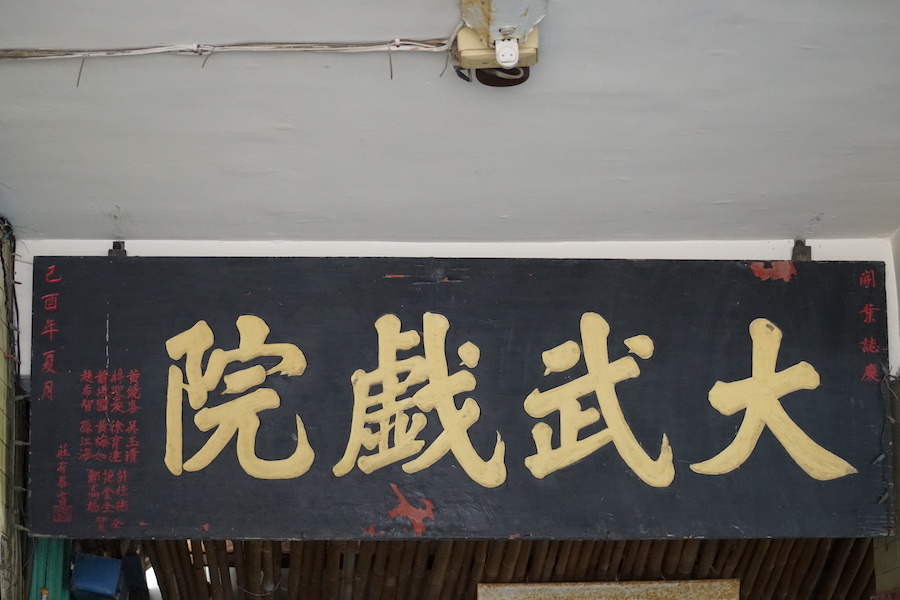
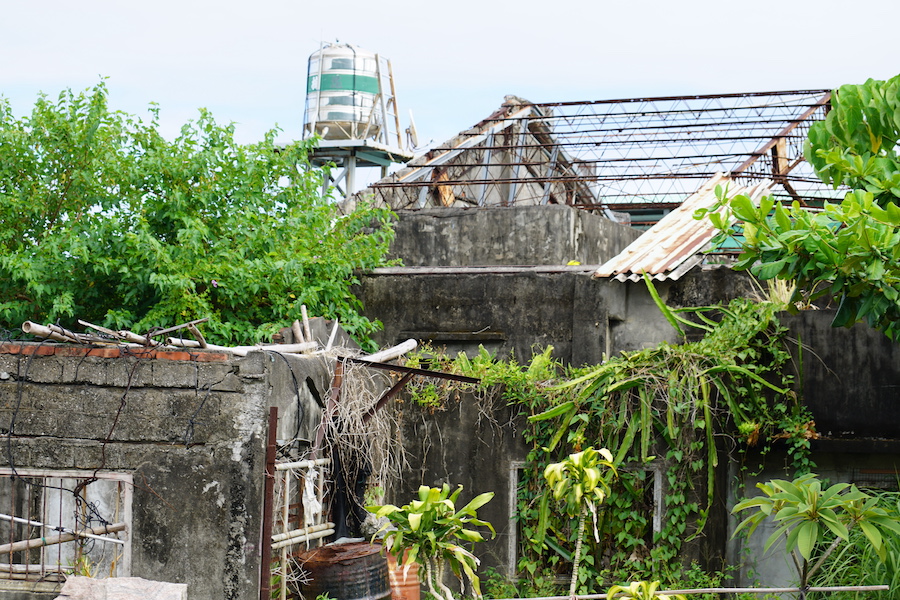
(圖片取自臺東縣政府 文化部國家文化記憶庫 source of pictures:Taiwan Cultural Memory Bank)
位於台東最南端的「南霸天」大武戲院,於民國58年創立,當時大武鄉作為屏東與臺東交通樞紐,當時大武沿海是台灣捕抓虱目魚苗和鰻苗的主要地區,再加上林班事業、瓊麻繩事業興盛,經濟繁榮,看電影曾是捕魚苗漁民、採瓊麻農民或伐木工人最主要休閒活動。
Located at the southernmost tip of Taitung, the“Southern Boss”, Dawu Theater, was established in 1969. At that time, Dawu Township served as the transportation hub between Pingtung and Taitung. The coast along Dawu was the main area for catching milkfish fry and eel fry in Taiwan, and with the prosperity of the forestry business and the sisal rope business, watching movies was once the main leisure activity for fishermen, sisal farmers, and loggers.
上百坪的戲院大廳可容納一千二百人,開幕時更由「文夏四姐妹」隨片登台,是台東地區開幕最風光的戲院,而大武戲院的匾額更是大武戲院開幕當天由各界政要聯合贈送,贈送人包含時任臺東縣長黃鏡峯、國大代表蔣聖愛、大武鄉鄉長、臺東縣議員、鄉民代表等人。
The theater hall of more than a hundred square meters can accommodate up to 1,200 people. Moreover, the “Four Sisters of Wenxia” were on stage at the opening of the theater. It was the most glamorous theater in the Taitung area. The plaque of Dawu Theater was a joint gift by dignitaries from all walks of life on the opening day of Dawu Theater, including the mayor of Taitung County, Huang Jing-Feng, National Assembly representative Chiang Sheng-Ai, the mayor of Dawu Township, Taitung County council members, and the township Councilmen.
在沒有電視的當時,戲院成了鄉間夜晚最佳消磨時間的去處,也是青年男女約會的絕佳場所,華燈初上電影院門口賣甘蔗、花生、烤香腸、烤魷魚等小販林立,成了一個小市集。走過風光歲月,隨著大武鄉捕魚苗、伐木和瓊麻產業的沒落,大武戲院虧損兩年後,於民國72年終於關門,現僅存遺構留在原地。
At the time when there was no television, the theater became the best place to spend time in the countryside at night, and also a perfect place for young boys and girls to date. In the evening, there were numerous vendors selling sugar cane, peanuts, grilled sausages, and squid at the cinema entrance, making it a small marketplace. With the decline of fishing, logging, and the sisal industry in Dawu Township, the Dawu Theater was closed in 1983 after two years of losses, and now only the ruined structure remains in place.
臺東市|最後一家熄燈的老戲院-大同戲院
The Last Old Theater Closed, Da-Tong Theater, in Taitung city.
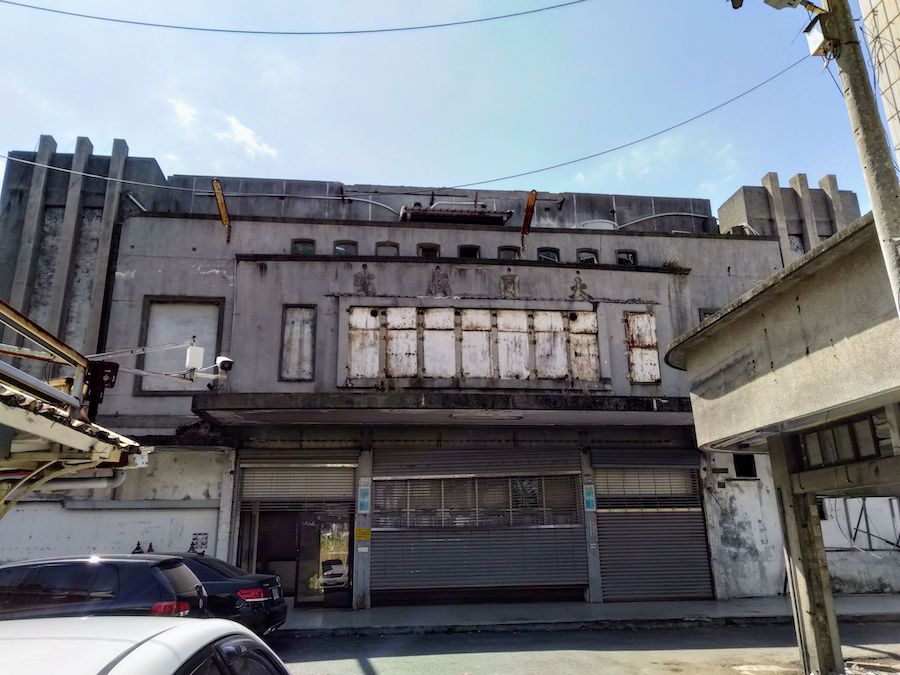
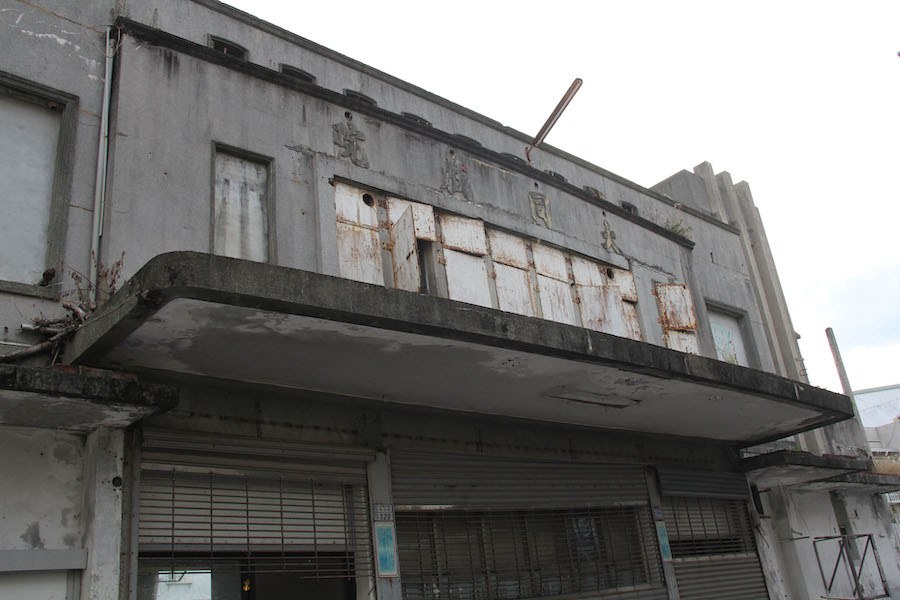
(圖片取自臺東縣政府 文化部國家文化記憶庫 source of pictures:Taiwan Cultural Memory Bank)
位於臺東市的大同戲院,是所有台東傳統戲院中最後一間結束營業的老戲院,不只是看戲,也是當時不少國高中舉辦畢業典禮的場所。民國45年建立的大同戲院,在面臨娛樂產業的變遷,仍屹立不搖的持續著經營更曾成為台東唯一的一間戲院。直到了2009年的一場祝融之災,建物近半全毀,也燒毀了原本的木構架屋頂,因火災關閉了的大同戲院,臺東人有段時間過著沒有電影院只能去外縣市看的日子。
The Da-Tong Theater in Taitung City is the last of the traditional theaters in Taitung to close. In addition to watching dramas, Da-Tong Theater was also a venue for many junior and senior high school graduation ceremonies. Da-Tong Theater was established in 1956. Faced with the vicissitudes in the entertainment industry, it has continued operating and was once the only theater in Taitung. It was not until 2009 that Da-Tong Theater was closed due to a fire that destroyed nearly half of the building and the original wooden roof. During that time, people in Taitung had to go to other counties to watch movies.
大火之後的大同戲院,仍可見兩層樓的建築外型以及若大的廣場空間,原本設有座位的空間轉變成為了附近居民的開心農場,常見有婆婆阿姨們在裏頭種菜。更有不少人士聲援保存這最後一座吹起熄燈號的台東老戲院,可惜在相關單位鑑定後判定戲院遺構為危樓,於2020年底,大同戲院難逃在怪手下走入歷史的命運。
After the fire, the two-story building and the large square could still be seen. The large seating space was transformed into a happy farm for the public, some women were often seen growing vegetables there. Many people have voiced their support to save the building. But after the county government identified it as a dangerous building by the end of 2020, Da-Tong Theater would not be able to escape the fate of going into history under the excavators.
臺東市|豪華戲院轉型為東和外科診所
Transformation of Taitung Luxury Cinema into Dong-He Surgical Clinic
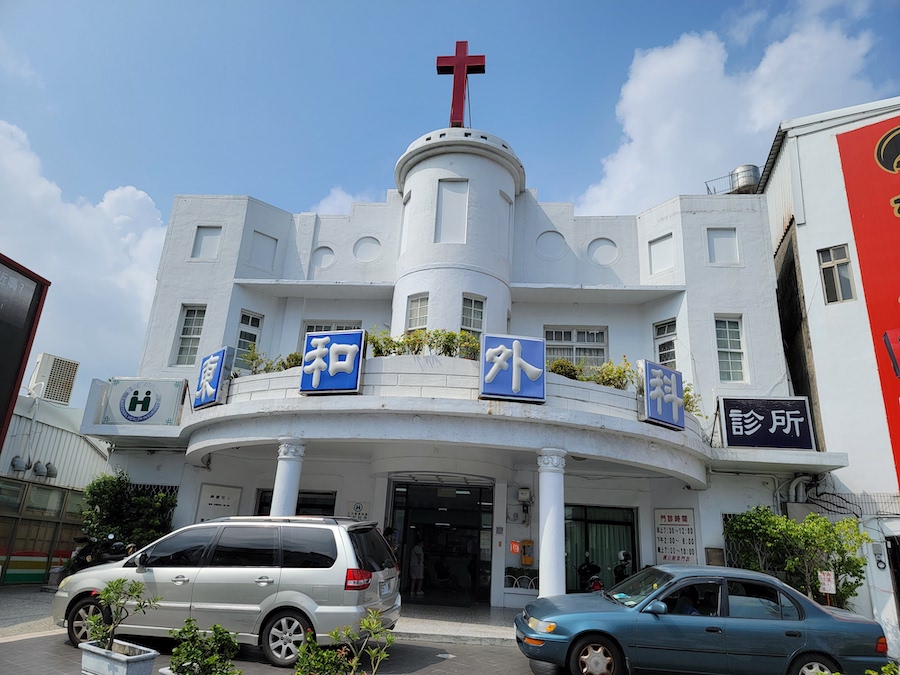
初來乍到臺東市區的朋友們一定會對於位在車水馬龍的中華路與大同路口有一棟白色城堡與頂部的十字架外觀的外科診所「東和外科」感到好奇吧!心想著是什麼樣的外科醫生會想要在這裡蓋一棟有這麼建築美感的醫院呢?美得就像是一座博物館一般。
For those of you who are new to Taitung city, you must be curious about the “Dong-He Surgical Clinic” which is located at the intersection of Zhonghua Road and Datong with a white castle and a cross on top. And you might wonder what kind of surgeon would want to build a hospital with such architectural beauty here? It is as beautiful as a museum.
其實…這裡一開始並不是為了蓋醫院建築的,而是一間戲院!這個位置一開始是臺東富人賴阿傳所開的運輸公司的倉庫,經營日本舶來品買賣交易。後來於1952年改以鋼筋混凝土興建「泰和戲院」,戲院的設計出自日人之手,敷地與牆壁的設計不惜成本,以鋼筋混凝土構成。內部空間可容納1,100人,內部還可約略看到一些原倉庫木構造的遺跡以及雨淋板、薰瓦等。1955年的元月1日正式開幕放電影,以放映西洋與日本電影為主,並於1965年易主後改為「和平戲院」。戲院結束於1985年,後改租給東和外科至今。
In fact, this was not a hospital in the beginning, but a cinema! The building started as a warehouse for a transportation company owned by a wealthy Taitung man, Lai Ah-Chuan, trading Japanese imported goods. It was later converted to “Tai-He Cinema” build with reinforced concrete in 1952. The theater was design by the Japanese. The flooring and the walls were made of reinforced concrete at no cost. The interior space could accommodate up to 1,100 people. Some remnants of the original wooden structure of the warehouse could be seen inside, as well as the clapboard sidings and the tiles. The theater was opened on January 1, 1955, and was mainly used to show Western and Japanese films. After changing its ownership, it was renamed “He-Ping Cinema” in 1965. The theater closed in 1985 and was later leased to Dong-He Surgical Clinic.
昔日的泰和戲院,今日的東和外科。
The former Tai-He Cinema, the present-day Dong-He Surgical Clinic.
由於泰和戲院以播放西洋與日本電影為主,有長輩就說以前老年人都不去泰和戲院的,因為.......聽不懂英文。隨著電影產業的沒落最終在「一片兩元」的尷尬下收場。而東和外科承接老戲院的浪漫,延續了這美麗的老建築的生命。
Since Tai-He Cinema mainly shows Western and Japanese movies, some elders said that in the past, elderly people did not go to Tai-He Cinema because ....... they could not understand English. With the decline of the film industry, the theater eventually ended up in the awkward “one movie, two dollars” situation. Dong-He Surgical Clinic take over the romance of the old cinema and continued the life of this beautiful old building.
關山鎮|俗稱「北霸天」的中華大戲院
The “Northern Boss”, Zhonghua Grand Cinema in Guanshan Town
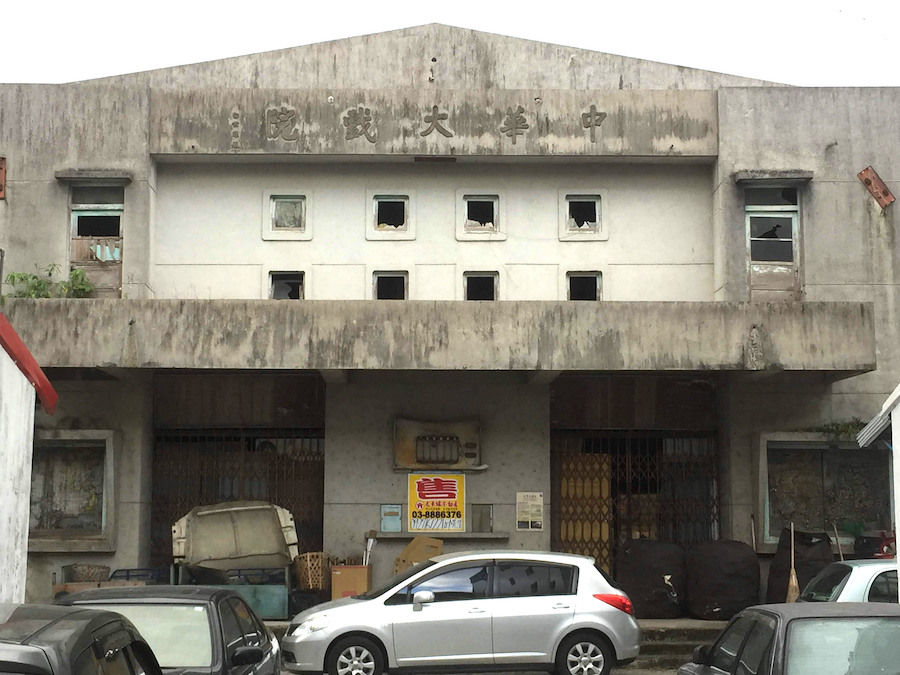
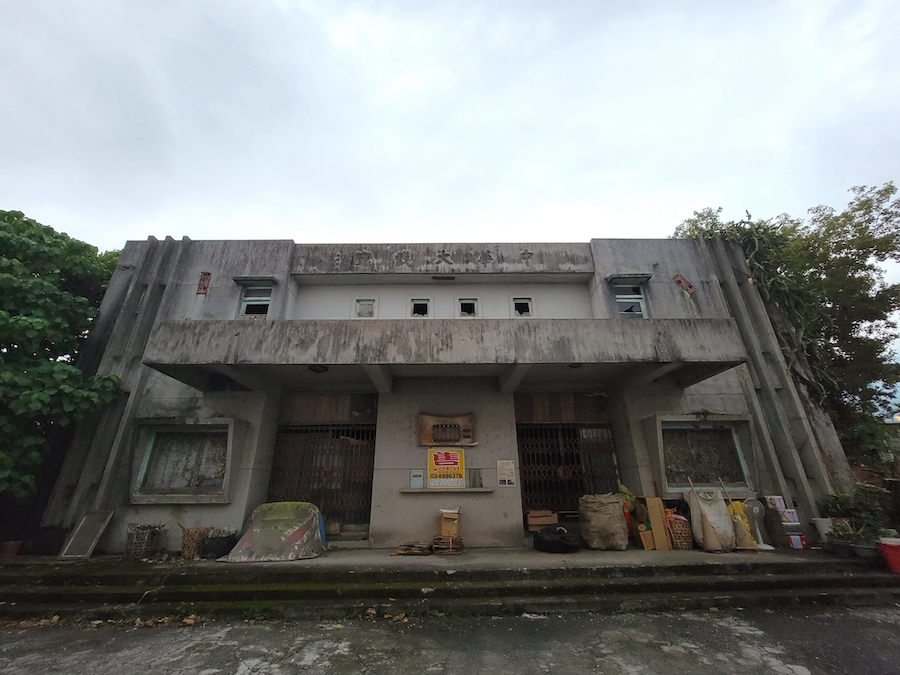
走在關山鎮靜謐的井字型的街道巷弄中,若不是在地人指點可能難以發現,在小巷子裡面藏身著一棟偌大的老戲院,也是目前關山鎮上現存唯一一棟的老戲院建築。
Walking in the quiet alleys of Guanshan town, it may be difficult to find the large old cinema building hidden in the alleyway if not pointed out by the local people. It is the only old theater building existing in Guanshan town at present.
曾在一旁的市場與戲院前廣場形成了最佳的市集攤販聚集的場域,熱鬧的叫賣聲每天上演,更難想像現今全鎮人口不到一萬人的關山小鎮,在最熱鬧的時期竟然有著三間的戲院!而中華大戲院是其中最大的一間,在50年前可稱是縱谷最大的戲院,在業界稱為「北霸天」!只可惜看電影的人潮從1200人的爆滿,到民國70幾年剩下不到10人,不得不拉下大門。
The market and the square in front of the theater once formed the best place for vendor’s stands to gather, and the bustling sound of hawking was played out every day. It is hard to imagine that the town of Guanshan, which has a population of less than 10,000, had three theaters at its peak! Zhonghua Grand Cinema was the largest one of the three and was even the largest theater in the Valley 50 years ago. And It was known as the “Northern Boss”! It was a pity that the movie-going crowd went from a full house of 1,200 people to less than 10 people in the 1980s, and the doors had to be closed eventually.
戲院休業後建物日漸的損壞,屋頂不僅破損甚至屋內還長出了顆大樹。但就像一個時空膠囊般的地將時空封存在那熱鬧的時光,牆上還依稀可見當時留存的海報「多情劍客斷情刀」、「搭錯車」…,以及當時的火車時刻表,車站到戲院步行不到五分鐘的距離,想必當時應該也有不少特意前來看電影影迷們吧!於2021年9月,因地主的決定關山中華大戲院偌大的空間遭拆除,僅剩正立面。
After the theater closed down, the building was gradually damaged. Not only the roof was broken but even a big tree grew inside the house. But like a time capsule, the memories were sealed in that lively time. The posters of the past, “The Emotional Swordsman Breaks His Love” and “The Wrong Train”, as well as the train timetable at that time, can still be seen on the wall. With a distance of less than a five-minute walk from the station, the theater must have many movie fans who came to see the movie on purpose! In September 2021, the large part of Zhonghua Grand Cinema in Guanshan was demolished due to the landlord’s decision, leaving only the front facade.
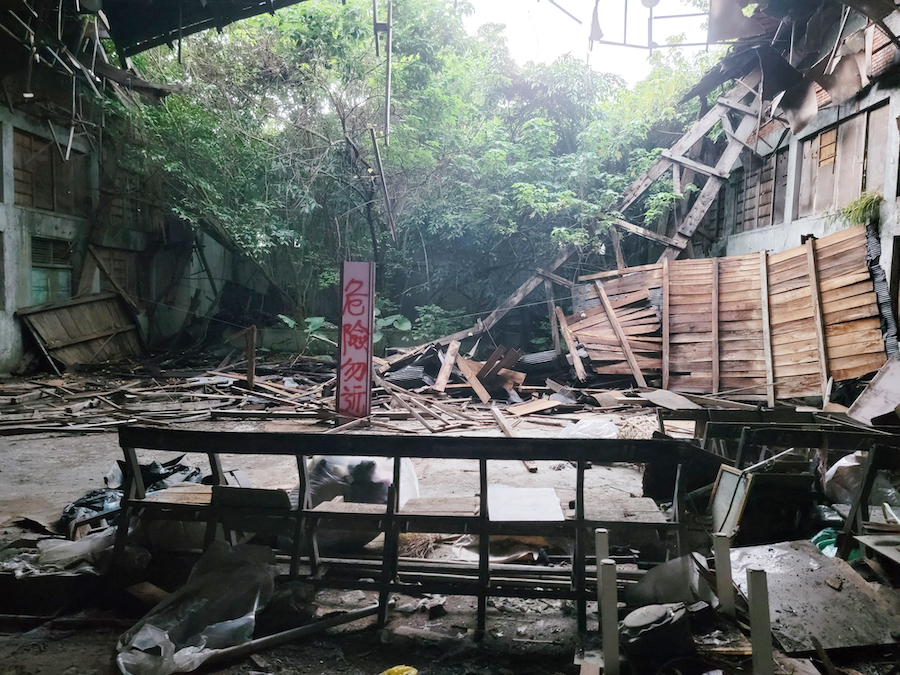
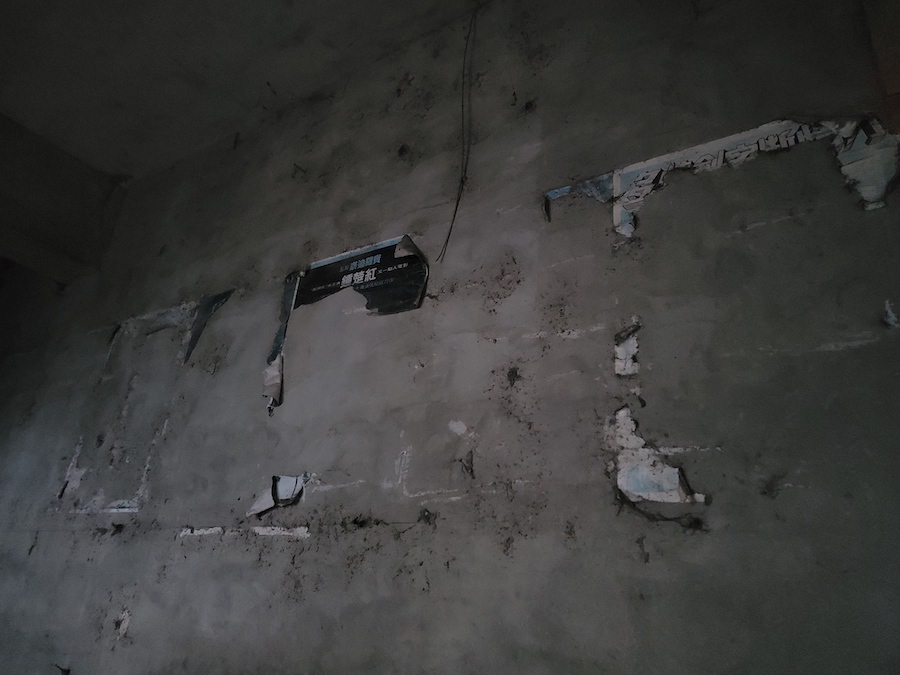
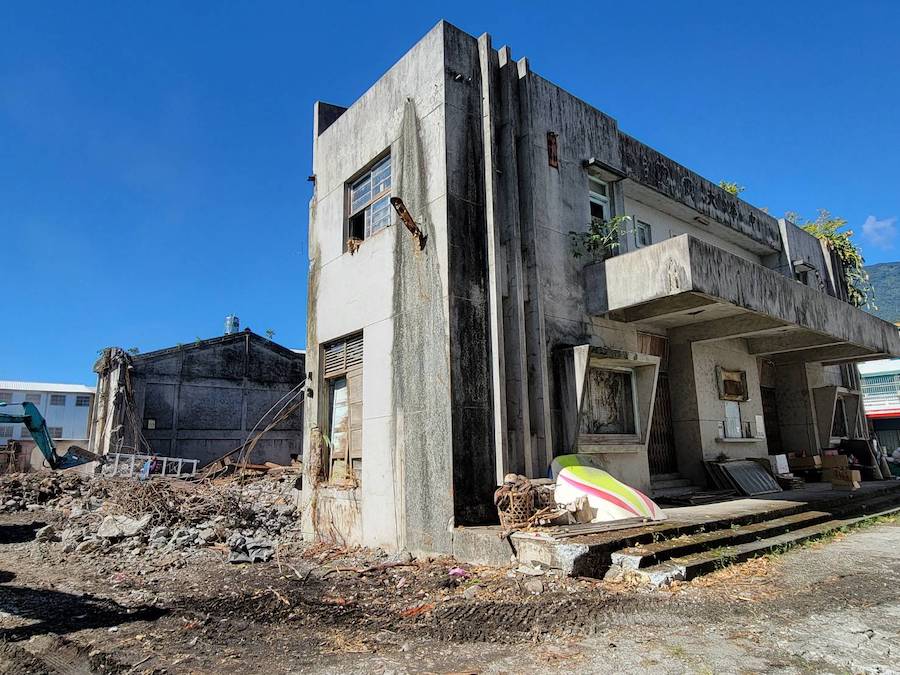
池上|與社區共同保存記憶的牆面-「北天王」五洲戲院
Chishang The “Northern Heavenly King”, Wu-Zhou Theater, Preserving the Walls of Memories with the Community
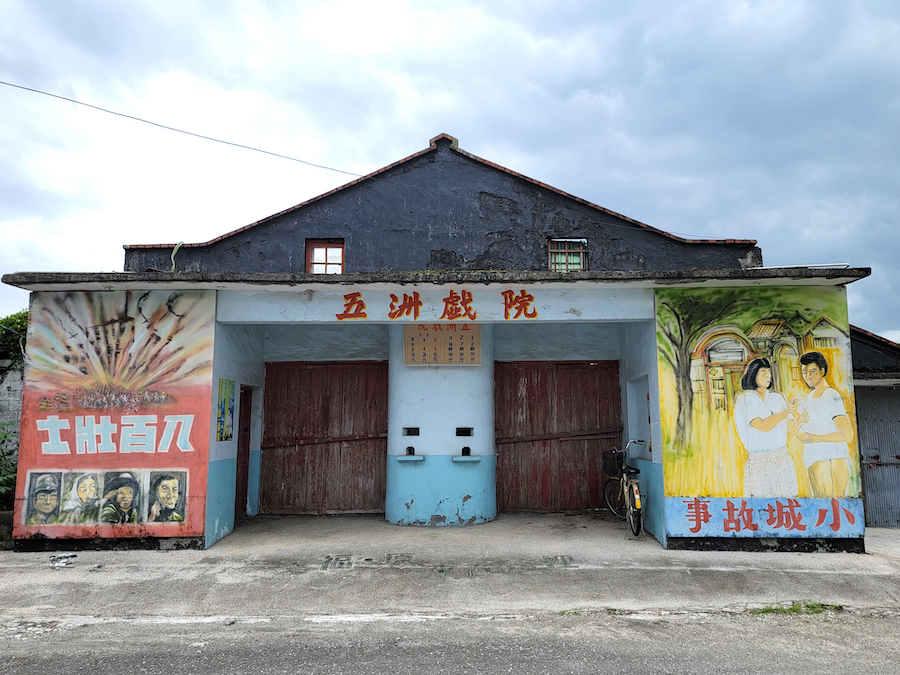
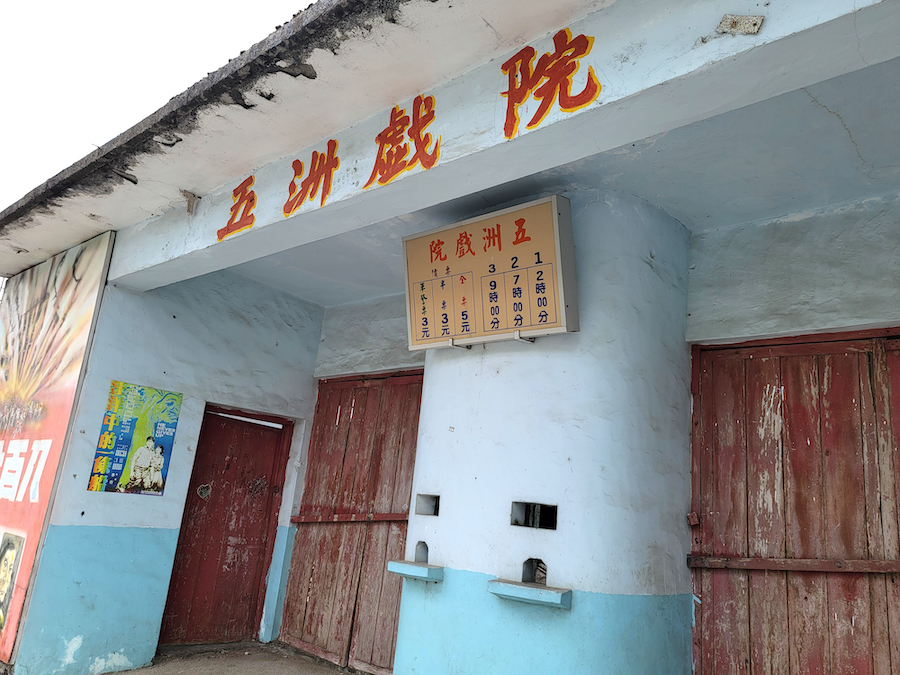
位在鐵路旁的池上五洲戲院,自1965年建成,至今仍保有部分建築體。當時為了服務鄰近的退輔會「台東農場」老兵,因此將露天戲臺改建為電影院。售票口的票價和播映時間記錄了台灣的曾經。民國54年建成,60年代池上鄉經濟發展繁榮,外來就業人口多,然而隨著經濟形態的改變,於民國71年結束營業。
Chishang Wu-Zhou Theater, located next to the railway, was built in 1965. Parts of the building are still preserved. At that time, the open-air theater was converted into a movie theater in order to serve the veterans of the “Taitung Farm”, a nearby retired auxiliary association. The ticket counter and the screening times are a record of Taiwan's past. It was built in 1965, and in the 1970s, the economy of Chishang Township was booming, with a large number of outside workers. However, with the transformation of the economy, it closed in 1982.
早期池上有三家戲院,當時池上鄉有開發處 (退輔會)、糖廠等政府單位約2000人,還有西部人到池上收購玉米、花生的盤商工人,以及在山區開墾的工人,他們最大的娛樂和休閒就是看電影。戲院老闆魏桂花說:「以前五洲戲院是老大哥,內設有400人的座椅,但通常座位是給長官們坐的,一般人搶不到位子的話,還有可容納450個人站位。每場次最多可提供近千人同時看電影呢!」
In the early days, there were three theaters in Chishang. There were about 2,000 people in the Development Office (Retired Auxiliary Association), sugar factories, and other government units, as well as traders from the west who came to buy corn and peanuts, and workers in the mountainous areas for reclamation. Their biggest entertainment was watching movies. The owner of the cinema, He Wei Gui-Hua, said that “Wu-Zhou Theater is the big brother. It has 400 seats in it. However, it was usually for the officials. If the general public couldn't get a seat, there is room for 450 people to stand. Each show can provide up to nearly 1,000 people to watch the movie at the same time!”
當時臺東電影不是院線片,而是3輪片,台北上映1、2年後片子才到台東。戲院老闆娘何魏桂花說,一部片子有4個膠捲,因此必須「跑片」,五洲戲院和鄰近的關山鎮東山戲院交換片子,東山戲院的帶子一結束就必須在半小時內送到五洲戲院,她的弟弟就是負責「跑片」。
At that time, films in Taitung were not first-run movies, but third-round. Only one or two years after movies premiered in Taipei that they would come to Taitung. The owner of the theater, He Wei Gui-Hua, said that a film only had four reels, so it had to be “bicycled”. Wu-Zhou Theater exchanged films with the nearby Dong-Shan Theater in Guanshan Township. Once the films from Dong-Shan Theater is finished playing, it must be delivered to Wu-Zhou Theater within half an hour. And her little brother is responsible for “bicycling the reels”.
五洲戲院因其建物主結構保存尚為完整,更曾在社區居民的共同努力下修復門面,邀請當時的海報繪師於門口畫下海報,希望讓戲院這份屬於大家共同的記憶能夠繼續延續,可惜在一陣颱風過後,五洲戲院的屋頂遭吹毀,建物主結構經日曬雨淋日漸脆化,僅剩由社區居民共同打造維護的門面依舊矗立在鐵道旁,迎接假日來池上造訪的遊客們。
The main structure of the Wu-Zhou Theater building is still intact, and the facade of it has been restored with the joint efforts of the community. They also invited the poster artist of the time to paint the poster on the entrance, in the hope that this common memory of the theater can continue to live on. Unfortunately, after a typhoon, the roof of the cinema was blown off and the main structure of the building became increasingly brittle under the sun and rain. Only the facade, which was built and maintained by the community, is still standing next to the railroad, welcoming visitors to Chishang on holidays.
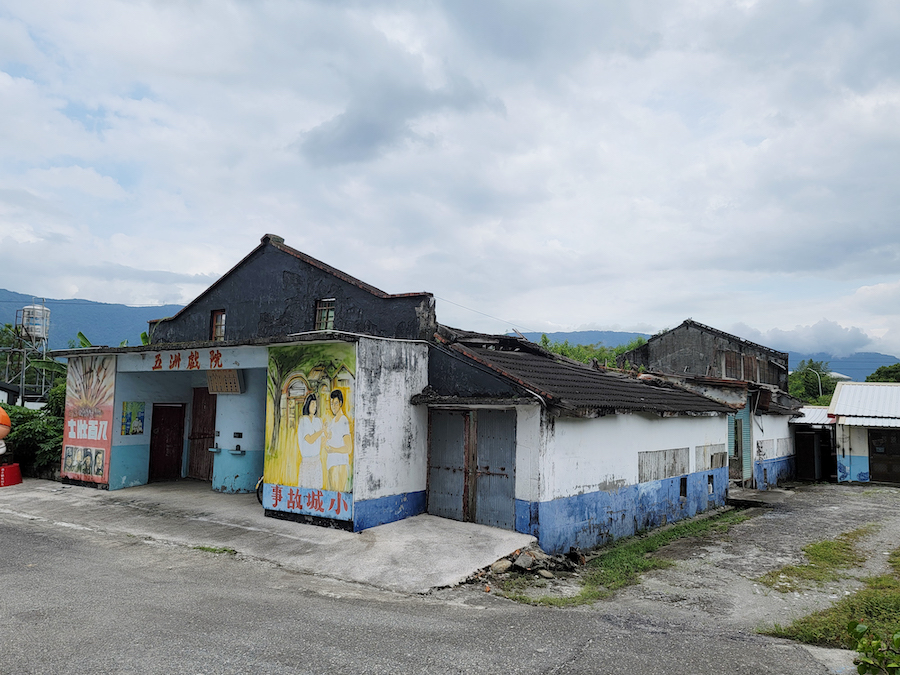
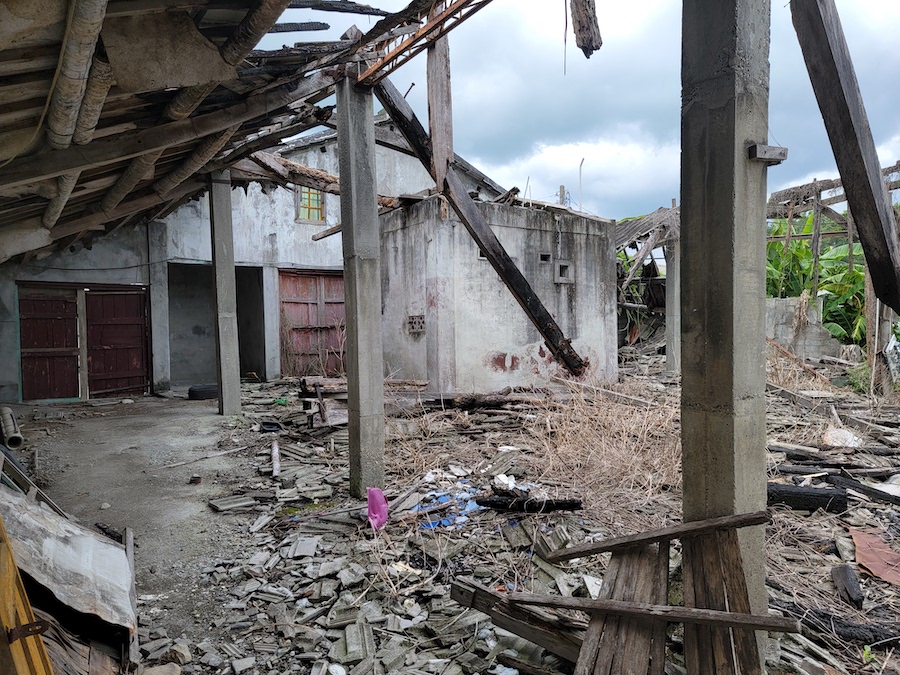
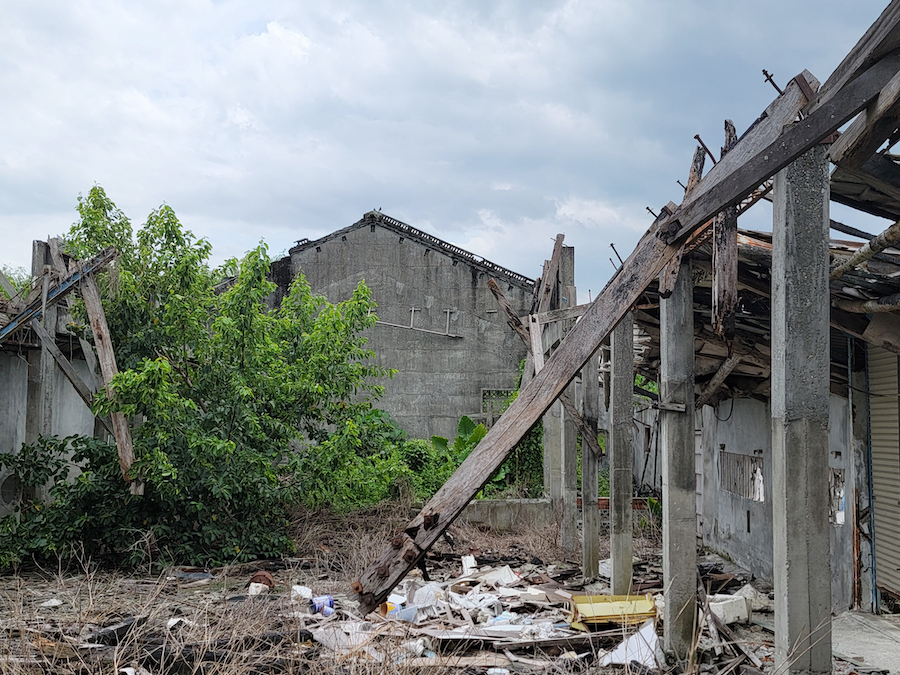
台灣戲院的興衰與文化記憶,隨著經濟型態的改變,與人才的離開,戲院市場漸漸凋零。更隨著電視的發展,休閒娛樂活動也漸漸地從在外面看戲改成在家裡看電視。空盪的廳院,見證經濟的轉型;電影的膠捲不在轉動,而大家看戲的記憶也隨著凋落的屋瓦、牆垣,漸漸地被人遺忘。
With the change of economy and the departure of talents, memories of the theater culture and the cinema market in Taiwan have gradually withered away. With the development of television, leisure and entertainment activities have slowly changed from watching movies to watching television at home. Empty theaters witnessed the transformation of the economy. The film reels are not spinning anymore, and the memories of watching movies are forgotten bit by bit along with the fading tiles and walls.
攝影/吳紀昀.文/吳紀昀